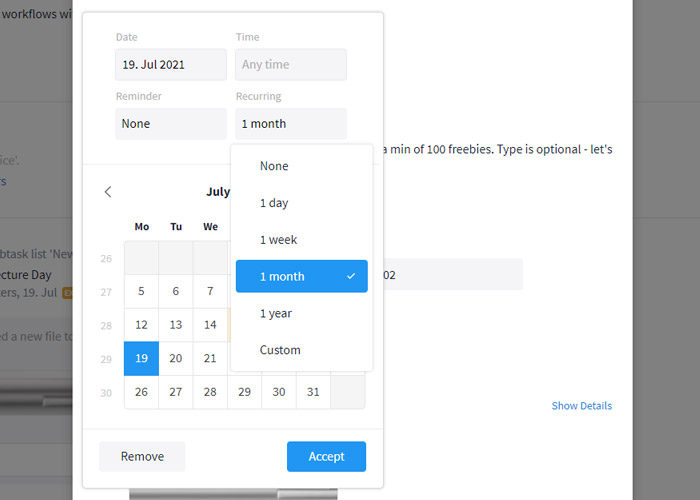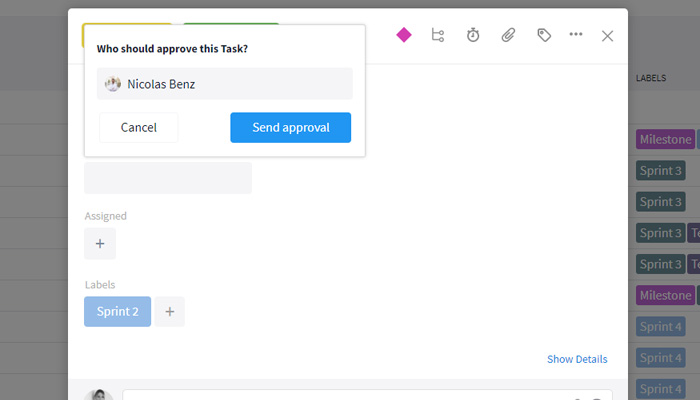According to a study by The Alternative Board (TAB), entrepreneurs claim they spend even 68,1% of their time performing day-to-day tasks, which makes them unable to define goals, create strategies and grow their businesses. This also raises another problem of entrepreneurs (and likely many managers): they work more than average employees - the majority of business owners spend more than 50 hours per week at work, which may lead to exhaustion and burnout.
The question of why delegating tasks is a crucial part of project management and of a leaders work sure finds its answer. However, the questions of what to delegate and how to delegate need to be discussed in more detail:
Delegate the right task to the right person
Delegation seems to be something straightforward. When we are overwhelmed with tasks, it’s enough to find some person who can do them for us, and that’s it, things go off the plate. The reality is far from that. The primary goal of delegation indeed is to stop doing the tasks that someone else can do as well or even better and focus on the tasks only a manager can do. However, it’s not about delegating anything to anyone willing to do it. The goal is to delegate the right tasks to the right people.
Why some people are “unable” to delegate
Sounds easy but in reality this goal is much harder to accomplish because many just “can not delegate”. But why is that?
Some managers see delegation as a potential blocker. It’s a relatively common psychological issue where people believe that the task is done well only when they’re involved in performing it to a huge extend.
There is also a common perception that delegating takes more time than doing the task outright. This is a vicious circle, since these tasks are recurring ones in many cases, rather than unique ones.
Though, there is another reason, why there are leaders that refuse to delegate: they see delegation as some kind of weakness. Yet, quite the opposite is true. Being able to efficiently delegate tasks demonstrates a sense of responsibility, organizational talent and good judgement (towards yourself and others). Leaders like that are leaders that know their team and trusts their employees.
Why delegation is crucial
Above all, the purpose of transferring tasks is to reduce the excessive workload of a person by offloading tasks that can be done by another person as well. This will lead to essential advantages:
- Avoiding burnout by reducing workload
- Better results through reasonable allocation of task according to competences
- Competence development and greater confidence of employees
- Creating an environment of trust by allowing more autonomy at the employee level
10 tasks you should delegate
1. Tiny, simple tasks you may even like
The problem with tiny tasks, such as sending some short emails, scheduling meetings, booking flights for business trips and similar down-to-earth tasks are much more time-consuming than they seem to be. Each one is small, but together, they can fill hours leaving you with a feeling you’ve done a lot but you didn’t even touch the most important duties. However, these are the tasks that a management should take care of in the first place.
2. Tedious tasks that require little skill
Copying and pasting data from an email marketing tool to the CRM may seem to be even relaxing, after energy-draining strategic meetings. But it’s not worth a manager’s time. If you can’t buy an all-in-one tool or automate things, delegate this task to an assistant.
3. Tasks someone can learn from
Just because you always cared about building and creating the homepage because you’re the only one familiar with HTML does not mean it has to stay that way. The basics of HTML - as well as those of various other activities - are not hard to learn. To perform well on on the more difficult tasks, it may be worth to upskill a team member and delegate it permanently and to gain a skilled employee. By the end, also the employee benefits from being given the opportunity to acquire new skills.
4. Special tasks
In the best case, a certain task is always done by the person who is best qualified for doing it. If something does not fit your, let’s say, own specialty, maybe it is the perfect task another person. You should ask yourself once in a while, whether you would choose yourself to do a certain job or someone else - even if you got used to dealing with them.
5. Time-consuming tasks.
Of course, it is always particularly dangerous for the productivity, as soon as certain tasks take a lot of time. Once these begin to become a distraction from the really important tasks, you should think about delegating them. So always give up time-consuming tasks, unless there are legal restrictions or they require your personal commitment or your experience and expertise.
Tip: Try to delegate tasks as a whole. Often more background information is needed for processing than previously thought. Collecting and understanding individual parts, work steps or results ultimately leads to the assignee losing track of things.
6. Interesting and fun tasks.
In order to increase the motivation within the team you should delegate exciting tasks that are fun working on, regularly. After all, no one works better than employees who enjoy their job. For this reason, it is also extremely important to notice the wishes of the employees. If somebody volunteers for certain tasks because he is interested in them and believes that he/she can handle them, this person should probably be given a chance.
7. Tasks that drain you out of passion.
On the other hand, if you realize that performing a task takes you much longer than it used to take or if you’ve been working on it so many times that you can’t stand them any longer, it’s high time to delegate. If there is absolutely no passion and dedication behind it we are likely to waste more time than necessary and run the risk of making mistakes. Who knows: others may be dedicated to do the work.
8. Routine, recurring tasks.
With this type of task, delegating is especially useful. Tasks that recur regularly and always run according to the same pattern, can be easily acquired. Since they can be done by other employees, as well, as soon as they have practice, it makes little sense to have routine tasks performed by the management.
9. Tasks in areas with often-changing regulations.
This is quite a high contrast to point 8. Granted, but if you think about it in more detail, delegating tasks that involve constantly changing regulations makes a lot of sense. When you are overwhelmed with work, it’s easy to overlook some changes and details. And Managers do have a lot on the plate. Staying up to date on all norms, laws and guidelines for specific tasks can be a time-consuming and hard-to-manage endeavor. It is better to hire/instruct someone who can focus on exactly this task. In addition, your team will gain an expert who is always well-informed about new changes.
10. Tasks that are not your responsibility.
Probably most of us have worked on a task that was actually not in our area of responsibility. But why would somebody do that? Quite simply, because the task was more fun than what’s on our own agenda? Caught! Conducting interesting research, something creative, writing a program using brand new technology - it’s a never-ending list. It could have worked if it wasn’t for for the tasks that really need to be done by you, urgently. However difficult it may sound: Everything that doesn’t require your personal involvement or expertise should be delegated to the person responsible.
How to delegate
Quite obviously, there is no sense in delegating randomly, without any planning. Therefore, it is important to bear some things in mind.
Be ready, to impart clear instructions and expectations.
When delegating routine and simple tasks, managers tend to assume that it’s as simple and straightforward for everyone. This also applies for everyday tasks and those that seem to be easy. A “Please take over application testing for me from now on” is not enough. Does the employee already have experience with testing. Does he/she know how to approach the task or is there a need for training? Are there special regulations and contact persons he/she should know? Many people tend to overlook essential questions because they do not seem to be worth mentioning and, ultimately, you waste more time than actually needed. Communicate clearly:
- the purpose (why?): Especially the reason behind the task is often regarded unimportant and therefore not communicated. Tasks, however, can be completed much easier when people know what the managers expect. Interruption caused by questions will decrease as they become superfluous. In addition, various studies, confirm that employees are more motivated when they see the meaning and bigger picture behind their tasks.
- the expectation (what?): What exactly is necessary to reach the goal? What does the supervisor imagine when thinking about the successfully executed task? What should be considered while working on it?
- the approach (how?): Anyone who delegates tasks that he usually would do on his own has an idea of how they can be done. A little insight into the supervisor's approach can be a great help to the employee. "Usually I start with [...], as this point later gives me some information about [...]"
- the time frame (when?): Lastly, it is important to have a clue about the deadlines.
Choose the right person
Is has been mentioned already: the right task for the right person. It seems to be obvious, but unfortunately, many managers don’t take their employees’ or team members’ interests, talents and skills under consideration while assigning tasks. Huge mistake! If you are interested, you are motivated. Also, there is probably no need to further explain the advantages of subject-specific skills. By the way: when choosing the right person, the workload is also crucial. Overworked employees will eventually be unable to do their best.
Provide guidance when needed and don’t neglect communication.
Communication is the key before and after delegation. If you delegate a task for the first time, be available and answer the questions that may appear. A project management software might be a huge help.
Give employees all the authority they need.
It’s not possible to delegate without giving a bit a control as well. Thus, in addition to the new tasks, a worker should also be given a certain amount of responsibility and autonomy of decision, e.g. in terms of budget or creative freedom. Those managers who do not do so are likely to be interrupted frequently, which - let’s be serious - is not the purpose of delegation.
Delegating with Stackfield at a glance
In Stackfield, you can easily assign tasks to one or more people. All relevant information and further discussion can be provided in the task description, the comments or by attaching links (documents) and files. Due to this, long searching for specific information has an end, nothing gets lost and all the details remain accessible in one central place - the task itself.

If you want to delegate a routine task, you can simply callify it as a “recurring task”. If the predecessor task is marked as “done”, Stackfield will automatically create a successor task whose due date is subject to the recurrence frequency specified by the creator. For example, a recurring task is created every first day of a month.

If there is only one part of a task to be delegated, you can add subtasks to the task. Each subtask can then be assigned to individual users.

It is also possible to create individual approval workflows to specify that it requires an assessment by a specific person (management) before a task can be marked as “done”.

Delegating properly is not difficult. Sometimes you have to give yourself a little jolt. Those who manage to do this will find that it's not the end of the world if they have to transfer responsibility for "routine tasks 152" to someone else.